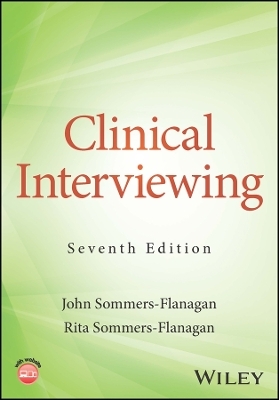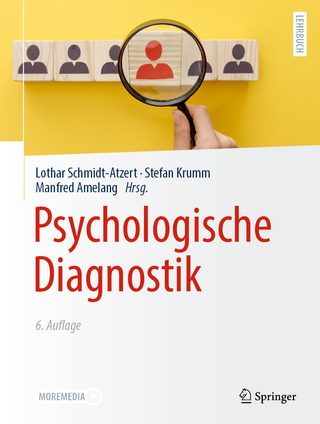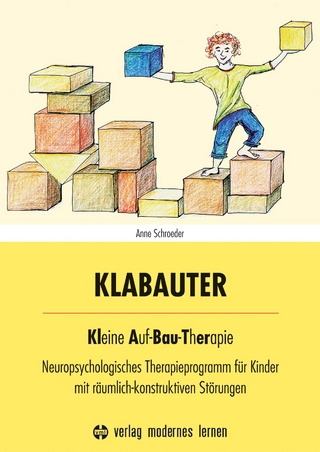
Clinical Interviewing
John Wiley & Sons Inc (Verlag)
978-1-119-98198-5 (ISBN)
Clinical interviewing is the foundation upon which all counselling and psychotherapy rests. In the newly revised seventh edition of Clinical Interviewing, John and Rita Sommers-Flanagan provide a comprehensive analysis and discussion of the clinical interview, along with skill-building applications. Extensive and practical coverage of culturally sensitive assessment, case formulation, treatment planning, and psychosocial interventions are included. This new edition continues in the Sommers-Flanagan's tradition of relationally oriented clinical interviewing; it also offers fresh content, cutting-edge citations, diverse case examples, updated language, and more deeply integrates culture, ethnicities, and diverse representation, while strengthening the book's evidence-based orientation. Learners will have an engaging reading experience with trusted authors who cover vital content for all mental health professionals. Readers will also find:
Complementary videos that feature a diverse range of clinicians and clients discussing core ideas and demonstrating key techniques
Guidance and strategies for clinician stress management and self-care
For the instructor's edition: An online instructor's manual with supplementary lecture ideas, discussion questions, classroom demonstrations, an online test bank, and downloadable PowerPoint slides
An essential text covering an equally essential topic, Clinical Interviewing is written for aspiring and practicing counselors, psychotherapists, and mental health professionals seeking up-to-date guidance on how to conduct a state-of-the-art (and science) clinical interview.
JOHN SOMMERS-FLANAGAN, PhD, is a clinical psychologist and professor of counseling at the University of Montana. He is the author or co-author of over 100 professional publications and a longtime member of the American Counseling Association and the American Psychological Association. RITA SOMMERS-FLANAGAN, PhD, is Professor Emerita at the University of Montana. Her work is focused on professional ethics, women’s issues, and spirituality’s connection to science and human well-being. She is a published poet, essayist, and clinical psychologist.
Preface xiii
About the Authors xxi
Part One: Foundations of Clinical Interviewing 1
Chapter 1: An Introduction to the Clinical Interview 3
Learning Objectives 3
Chapter Orientation 3
Welcome to the Journey 3
What Is a Clinical Interview? 5
Clinical Interviewing versus Counseling and Psychotherapy 7
Multicultural Competencies 13
Multicultural Humility 17
A Learning Model for Clinical Interviewing 25
Chapter Summary 28
Chapter 2: Preparation 31
Learning Objectives 31
Chapter Orientation 31
The Physical Setting 31
Professional and Ethical Issues 38
Multicultural Preparation 55
Stress Management and Self-Care 65
Chapter Summary 68
Chapter 3: An Overview of the Interview Process 71
Learning Objectives 71
Chapter Orientation 71
Stages of a Clinical Interview 71
The Introduction 73
The Opening 84
The Body 90
The Closing 95
Ending the Session (Termination) 104
Chapter Summary 107
Part Two: Listening and Relationship Development 111
Chapter 4: Nondirective Listening Skills 113
Learning Objectives 113
Chapter Orientation 113
Listening Skills 113
Adopting a Therapeutic Attitude 114
Why Nondirective Listening Is Also Directive 123
The Listening Continuum in Three Parts 125
Skills for Encouraging Client Talk 126
Ethical and Multicultural Considerations 142
Not Knowing What to Say 145
Chapter Summary 146
Chapter 5: Directive Listening Skills 149
Learning Objectives 149
Chapter Orientation 149
Skills for Encouraging Insight 150
Ethical and Multicultural Considerations 175
Chapter Summary 178
Chapter 6: Skills for Directing Clients Toward Action 181
Learning Objectives 181
Chapter Orientation 181
Readiness to Change 181
Skills for Encouraging Action 184
Using Educational and Directive Techniques 192
Ethical and Multicultural Considerations 204
Chapter Summary 215
Chapter 7: Evidence-Based Relationships 217
Learning Objectives 217
Chapter Orientation 217
The Great Psychotherapy Debate 217
The Core Conditions 218
Other Evidence-Based Relationship Factors 233
Evidence-Based Cross-Cultural Relationships 250
Chapter Summary 253
Part Three: Structuring and Assessment 255
Chapter 8: Intake Interviewing and Report Writing 257
Learning Objectives 257
Chapter Orientation 257
What’s an Intake Interview? 257
Exploring Client Problems and Goals 259
Obtaining Background and Historical Information 267
Assessment of Current Functioning 276
Brief Intake Interviewing 280
The Intake Report 282
Do's and Don'ts of Intake Interviews with Diverse Clients 298
Chapter Summary 300
Chapter 9: The Mental Status Examination 303
Learning Objectives 303
Chapter Orientation 303
What Is a Mental Status Examination? 303
Individual and Cultural Considerations 305
The Psychiatric Mental Status Examination 308
When to Use Mental Status Examinations 340
Chapter Summary 342
Chapter 10: Suicide Assessment 345
Learning Objectives 345
Chapter Orientation 345
Facing the Suicide Situation 345
Suicide Risk Factors, Protective Factors, and Warning Signs 348
Building a Theoretical and Research-Based Foundation 356
Suicide Assessment Interviewing 360
Suicide Interventions 380
Final Ethical and Professional Issues 385
Chapter Summary 389
Chapter 11: Diagnosis and Treatment Planning 393
Learning Objectives 393
Chapter Orientation 393
Modern Diagnostic Classification Systems 393
Defining Mental Disorders 396
Diagnostic Interviewing 404
The Science of Clinical Interviewing 406
Less Structured Diagnostic Clinical Interviews 409
Case Formulation and Treatment Planning 415
Extended Case Example 423
Additional Cultural Modifications and Adaptations 427
Chapter Summary 428
Part Four: Diverse Populations and Situations 431
Chapter 12: Challenging Client Behaviors and Demanding Situations 433
Learning Objectives 433
Chapter Orientation 433
Challenging Clients 433
Motivational Interviewing and Other Strategies 436
Violence Risk Assessment (VRA) and Prediction 451
Demanding Situations: Crisis and Trauma 456
Cultural Competencies in Disaster Mental Health 468
Chapter Summary 470
Chapter 13: Interviewing Young Clients 473
Learning Objectives 473
Chapter Orientation 473
Considerations in Working With Young Clients 473
The Introduction 475
The Opening 479
The Body of the Interview 490
Closing and Termination 503
Culture in Young Client Interviews 506
Chapter Summary 508
Chapter 14: Online and Distance Clinical Interviewing** 553
Learning Objectives 533
Chapter Orientation 553
Technology as an Extension of the Self 554
Definition of Terms and Communication Modalities 557
Distance and Online Assessment and Intervention Research 561
Ethical and Practical Issues: Problems and Solutions 565
Conducting Online or Distance Interviews 573
Culture and Online Culture 575
Chapter Summary 576
Epilogue
References 589
Author Index 639
Subject Index 655
| Erscheinungsdatum | 08.02.2024 |
|---|---|
| Verlagsort | New York |
| Sprache | englisch |
| Maße | 178 x 252 mm |
| Gewicht | 975 g |
| Themenwelt | Geisteswissenschaften ► Psychologie |
| ISBN-10 | 1-119-98198-0 / 1119981980 |
| ISBN-13 | 978-1-119-98198-5 / 9781119981985 |
| Zustand | Neuware |
| Informationen gemäß Produktsicherheitsverordnung (GPSR) | |
| Haben Sie eine Frage zum Produkt? |
aus dem Bereich


